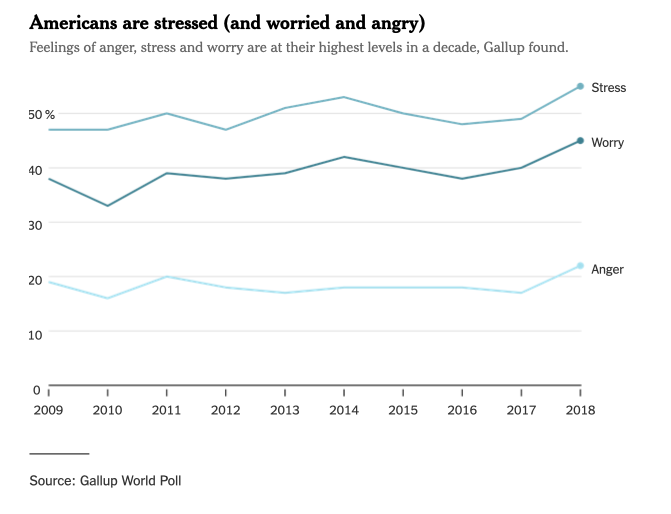by Emily Carpenter-Pulskamp
The 21stcentury comes with all kinds of amazing technology to make our lives easier, faster, and more connected. And super-efficient transportation means we can be in small town USA in the morning and then the bustling streets of another country by nightfall. Live far away from your family? No problem, carve out some time on your jam packed schedule to get some one-on-one time on FaceTime. You could even do it while you are walking the dog or taking your son on a scooter ride. Feel like you need an edge in your career? Take an online master’s degree program to get it. Never mind that you are going to see 1 a.m., 2 a.m., and 3 a.m. roll around and then get up at 5 a.m. to pack lunches, inhale some coffee and swoosh the kiddos off to school. And, yes, we all work really fast-paced and (hopefully) rewarding careers that are equally demanding. In the end, it’s all worth it. It really is!
We are a nation of busy, busy, busy people. And with the activities, work, kids, and degrees come stress and burn out as we try to make it all fit. According to a recent New York Times article, Americans are the most stressed out people in the world (Chokshi, 2019). The author reported that in an annual Gallup poll that surveyed more than 150,000 people around the world American’s reported the most levels of stress, anger and worry in a decade.

I am part of this wonderful tribe of people trying to do all the things related to being a mom, a graduate student, professional consultant, friend, wife, and just a cheerful, giving person in general. And, I really do want to do it all. But I found myself giving from an empty cup and resenting it. So, like everyone else I went to the internet to learn more about mindful meditation. I then proceeded to downloaded at least four apps to start practicing meditation.
I soon learned that meditation is the art of learning to focus your attention to achieve balance. According to Mindworks.com it helps us to “focus our attention on here and now with goodwill and without judgement.” I quickly found out it’s actually not easy to keep your mind focused for a period of time.
A study by the National Center for Complimentary and Integrated Health (2012) put the number of adults practicing meditation at 18 million and growing, approximately 8 percent of the U.S. adult population. Meditation has its roots in the Eastern religious or spiritual traditions and is used today without those parameters. Mindful meditation programs can be found everywhere now, including corporate workplaces, schools, hospitals, yoga studios, and more. Don’t forget about the myriad of smartphone apps available, including Insight Timer, Meditation Studio, Happier, Headspace, and Calm to name just a few.
Does it really bring inner peace and calm? According to a Thriveglobal.com article, studies on mindfulness have repeatedly shown that meditation develops the habit of being aware where you are in the present moment (Gil, 2017). It gives us space in our mind. It has been shown that people under stress will respond to situations impulsively with anger and are not capable of slowing down enough to consider their response or how it will make other people feel (Gil, 2017). I have been that impulsive person and walked away thinking, “Wow, I just made that situation a lot bigger than it needed to be because of the way I acted. And I hurt people’s feelings. Why did I do that?” Studies show that meditation programs give people the ability to think about and adjust their reaction before responding. According to the article, “meditation literally “lights up” or “exercises” eight different parts of the brain, many associated with better and more deliberate decision making.” (Gil, 2017)
Obviously, technology and the speed at which we live isn’t going away any time soon. But we can learn to make better decisions about how we choose to live and how we interact with other people. As for the apps that I downloaded I ended deleting them all and signing up for USC’s weekly Mindful Lab program instead. It’s off to a great start with an amazing instructor and a really interesting group of people!
And don’t worry, Choksi reported in that same poll that in spite being the most stressed nation, people in America were also found to have more positive experiences than the rest of the world (2019). There is hope!
Fight On!
References
Chokshi, N. (April 25, 2019). American arethe most stressed people in the world, poll finds. Retrieved from: https://www.nytimes.com/2019/04/25/us/americans-stressful.html
Gil, S. October 11, 2017. Mindfulness – why all the hype? The science of meditation. Retrieved from:
https://thriveglobal.com/stories/mindfulness-why-all-the-hype-2/
Mindworks.com (n.d.) How many people meditate. Retrieved from: https://mindworks.org/blog/how-many-people-meditate/
National Center for Complimentary and Integrated Health. 2012. Use of complementary Health Approaches in the U.S. Retrieved from: https://nccih.nih.gov/research/statistics/NHIS/2012/mind-body/meditation

3 Responses to Mindfulness for Modern America